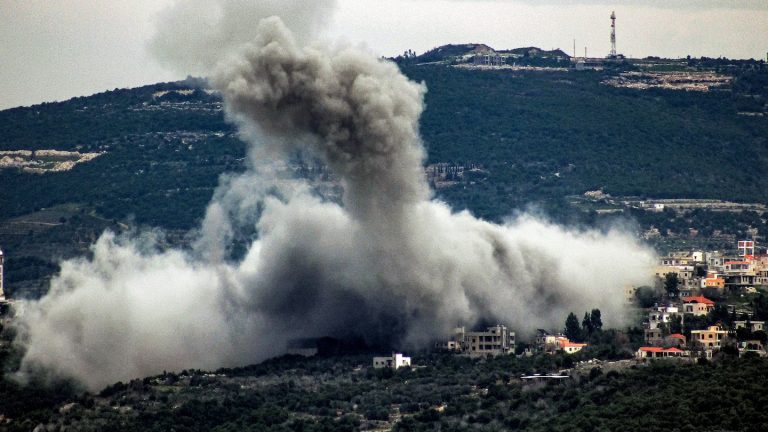Israeli fighters began A widespread wave of attacks on Lebanese territoryIsraeli Admiral Daniel Hagari made the announcement as the strikes were being carried out, saying details would follow.
This action came in the wake of a morning attack launched from Lebanon on the town of Safed in northern Israel, hitting a house and an Israeli army base. Ilana Stein, spokeswoman for the National Public Diplomacy Directorate, said that an Israeli woman was killed and at least eight people were injured. It blamed Hezbollah's rocket launches. “This is no longer our reality,” she said.
Hezbollah, a paramilitary group allied with Iran and the most powerful political group in Lebanon, did not immediately claim responsibility.
Hezbollah has joined a host of groups that say it supports Hamas by striking Israel and, in some cases, American interests in the region since October 7.
That's the day Hamas launched its bloody attack on Israel, killing 1,200 people and taking 253 others to Gaza hostage, according to Israeli authorities. Israel responded with a military campaign that it says aims to eliminate Hamas and other fighters from the Strip. More than 28,000 people were killed there.
Since October 7, rockets have been launched across the unmarked border area between Lebanon and Israel on an almost daily basis. Nearly 170 Hezbollah members have been killed, according to a tally based on death notices issued by the group.
The Lebanese National News Agency said that the civilians killed on Wednesday were a Syrian mother, her two-year-old son, and her 13-year-old stepson. Their bodies were recovered from under the rubble of their destroyed house.
Tens of thousands of residents of southern Lebanon and northern Israel have fled their homes over the past four months, largely depopulating the area. Human losses were almost entirely limited to fighters; Civilian deaths were rare.
As the fighting intensified and the scope of strikes expanded in both countries, diplomats from the United States, Britain, France, and the European Union flocked to Lebanon in an attempt to avoid a full-scale war. Israeli officials have repeatedly warned, both in public statements and privately to allies, that time for diplomacy is running out.
Israel warned Washington in late December that if a long-term border agreement was not reached soon, Israel would escalate its fight with Hezbollah. Officials familiar with the talks understood at the time that the end of January was a soft deadline for the two sides to reach an agreement.
Hezbollah leader Hassan Nasrallah on January 5 addressed for the first time the possibility of permanently demarcating the line between the two countries — a move that the United States, other Western governments and the United Nations have been advocating for years.
But Nasrallah made clear that the discussions would not take place before a ceasefire in Gaza.
This week, France submitted a proposal to the Lebanese government emphasizing the importance of implementing a UN resolution directing armed personnel, assets and weapons not belonging to the Lebanese government or UN peacekeeping forces to withdraw approximately 25 miles from the border.
But discussions on a ceasefire on the border are “the same as they were before,” according to a European diplomat who spoke on the condition of anonymity to discuss the sensitive situation. He said that the talks did not reach a dead end, “they do not exist” – Hezbollah will not participate in any discussion while the war continues in Gaza.
Nasrallah said on Tuesday that diplomats visiting Lebanon clearly prioritize Israel's security and echo its demands.
“These delegations… are trying to intimidate,” he said in a televised speech. He said that one delegation warned last month that Israel would launch a war within two days.
“This party of intimidation… will not succeed,” Nasrallah said. “Now, if we stop fighting in the south, so what [will happen] To Gaza?
But the European diplomat said that talk about negotiations for a ceasefire in Gaza is “not good.” He added that progress in the talks mediated by the Qatari and Egyptian governments had slowed due to disagreements over the Palestinians whom Israel would release in exchange for the release of hostages held in Gaza.
“There are names [the Israelis] “I don’t want to think about it, including Marwan Barghouti,” the diplomat said, referring to the Fatah-linked paramilitary leader who is serving five life sentences in Israeli prison for the murder of five people.
Even while imprisoned, Barghouti (64 years old) is considered one of the most popular Palestinian political leaders, respected and admired throughout the West Bank and Gaza Strip. The European diplomat said that members of the international community tried to convince Israel that Barghouti is the only alternative to Hamas, because he is seen as part of “the renewed class in Palestine to replace the current class.”
Wednesday's attacks showed that attention is shifting to Lebanon as the war in Gaza slows. It was not clear whether Israel would expand the scope of the attack beyond Hezbollah near the border to include other Lebanese targets farther north. Low-flying planes over Beirut on Wednesday raised fears of an upcoming attack.
On Wednesday, Israeli Minister Benny Gantz threatened such an expansion. He said: “We must be clear: The one responsible for the shooting from Lebanon is not Hezbollah alone, but also the Lebanese government and the Lebanese state that allows shooting from its territory.”
“There is no military target or infrastructure in the northern part of the country that is not within our sights,” he said.
Lior Soroka in Tel Aviv, Mohamed Al-Shamma and Susan Haidamus contributed to this report.

